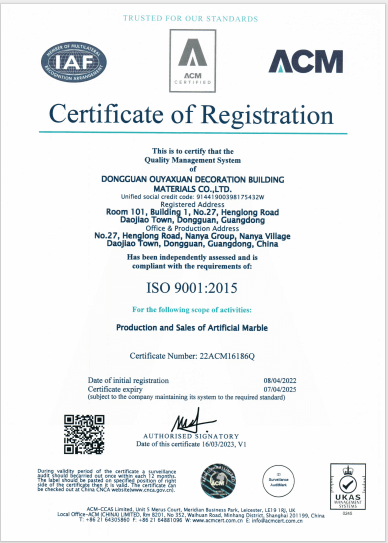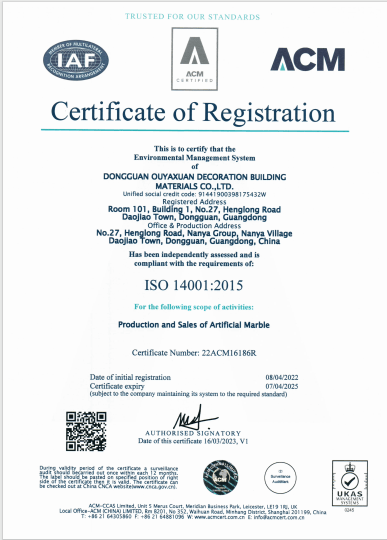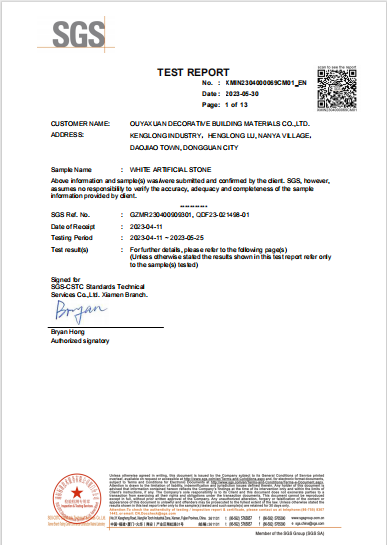

ISO Certification: Ensuring Excellence in Quality Management Systems
What is ISO certification?
ISO certification is a formal recognition that an organization has met the requirements of a particular ISO standard. ISO develops internationally accepted standards that cover various aspects of business operations, with the most well-known being the ISO 9001 standard for quality management systems (QMS). The certification process involves an independent third-party assessment conducted by accredited certification bodies.
Advantages of ISO certification:
1. Enhanced credibility and reputation: ISO certification is globally recognized and demonstrates an organization's commitment to quality and customer satisfaction. It enhances credibility and strengthens the organization's reputation, making it more attractive to customers, partners, and stakeholders.
2. Improved customer satisfaction: ISO 9001 certification focuses on meeting customer requirements and enhancing customer satisfaction. By implementing effective quality management systems, organizations can consistently deliver products and services that meet or exceed customer expectations, leading to higher customer satisfaction levels.
3. Process efficiency and effectiveness: ISO certification requires organizations to establish well-defined and documented processes. This promotes clarity, consistency, and efficiency in operations, minimizing errors, rework, and waste. As a result, organizations can achieve cost savings and increased productivity.
4. Enhanced decision-making: ISO certification enables organizations to gather and analyze data to make informed decisions. The standard emphasizes the use of data-driven decision-making, ensuring that decisions are based on objective evidence rather than assumptions or guesswork.
5. Compliance with regulations and standards: ISO standards often align with legal and regulatory requirements. By adhering to ISO standards, organizations ensure compliance with applicable laws and regulations, minimizing the risk of legal non-compliance and associated penalties.
6. Better supplier relationships: ISO certification can improve relationships with suppliers. Through the certification process, organizations establish clear criteria for selecting and evaluating suppliers, ensuring that they meet the same rigorous quality standards. This fosters trust, collaboration, and a more effective supply chain.
7. Continuous improvement: ISO certification encourages organizations to adopt a culture of continuous improvement. Following ISO standards requires regular review, monitoring, and measurement of processes. This helps identify areas for improvement, leading to ongoing optimization and enhanced performance.


SGS Certificate Ensures Quality and Compliance for Global Trade
What is an SGS certificate?
An SGS certificate is an official document issued by SGS after conducting rigorous assessment, testing, and verification processes. It serves as proof that a product, process, or system complies with specific international standards, regulations, or customer requirements. SGS's extensive expertise and global recognition make its certificates highly reputable within the industry.
Benefits of an SGS certificate:
1. Quality assurance: An SGS certificate demonstrates that a product or service has undergone thorough quality checks and meets predefined quality criteria. This assurance enhances customer confidence, as they can trust that the certified goods or services are of superior quality.
2. Compliance with regulations: SGS certification ensures adherence to relevant international, regional, or industry-specific regulations. This is particularly crucial in heavily regulated sectors such as food, pharmaceuticals, automotive, and electronics. Being compliant not only helps businesses avoid legal issues but also opens doors to new markets with strict regulatory requirements.
3. Market access facilitation: Many countries impose mandatory certification requirements to protect domestic markets and consumers. An SGS certificate helps businesses navigate these import regulations, enabling smooth market access by demonstrating compliance with local product safety, quality, and other applicable standards.
4. Enhanced brand reputation: Holding an SGS certificate reflects a commitment to quality and compliance, enhancing the brand reputation of a business. It provides a competitive edge and differentiates certified businesses from their competitors, attracting customers who prioritize quality and trust.
5. Risk mitigation: SGS certifications help mitigate risks associated with product failures, recalls, and non-compliance. By undergoing comprehensive testing and verification, businesses can identify and rectify potential issues before they become costly problems. The certification process ensures that products meet safety standards, reducing the risk of harm to end-users.
6. Supply chain optimization: SGS certificates streamline supply chain processes. They provide assurance to buyers that goods or services meet their quality requirements, simplifying sourcing decisions. This facilitates effective supplier management, reduces procurement risks, and improves overall supply chain efficiency.
